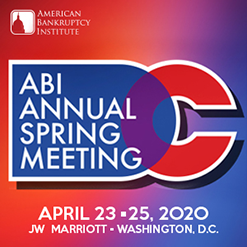| |
| |
| vol 15, num 1 | February, 2020 |
| |
|
|
| |
|
|
|
|
|
| |
| ABI International Committee Co-Chair Corner 2019 |
| It has been another great year for the International Committee. As co-chairs, we would like to thank all the members of the ABI International Committee for their support and continued participation on the committee for 2019. The committee’s success reflects the hard work of its members each year.
As always, we also thank the support of the ABI staff and the ABI Board of Directors, both of whom helped to facilitate and guide our work throughout the year.
This year especially, we express our huge thanks to Sam Gerdano, who concluded his role as ABI executive director last year and who has been instrumental in the success of our cross-border conferences. We happily welcome incoming Executive Director Amy Quackenboss, who has always been a vital resource for our committee.
Lastly, we want to let everyone know that 2020 will be Rafael Zahralddin’s last year serving as co-chair for this committee. He has served as Special Projects Leader, Education Director and Newsletter Editor for the committee in recent years. He has also served on the Advisory Committee for the Cross-Border Conference, for which he also acted as a moderator, speaker and author of CLE materials. We thank him for his dedicated service in all of these roles. We especially want to thank Rafael’s firm, Elliott Greenleaf, P.C., who has been a sponsor in various capacities for the committee during this time.
|
| |
|
|
|
|
| |
|
| |
| A New Insolvency Law for the Dubai International Financial Centre |
| Not all governmental units within a jurisdiction change their laws in concert with each other, nor should they: They may have different roles, functions, populations and constituencies, and financial profiles.
The structure of insolvency legislation in the United Arab Emirates (UAE) reflects this pattern of diversity in law change, with resulting differences in the operation of the laws: (1) The UAE has its overarching insolvency law; (2) the seven constituent emirates have varying ways of addressing insolvency, in many instances relying on the UAE federal insolvency law; and (3) the internationally oriented financial centers or economic zones of Dubai and Abu Dhabi (the Dubai International Financial Centre (DIFC) and Abu Dhabi Global Markets (ADGM)) have their own insolvency regimes, as well as their own independently functioning court systems for resolving problems that arise within the jurisdictional scope of those centers/zones. These systems were adopted at different times and reflect different styles and policies characteristic of the times of adoption. Until 2019, the
DIFC’s insolvency law, dating back to 2003 and replaced in 2009, was older than the ADGM’s (which comes from regulations dated to 2015, with amendments through 2016). In 2016, the UAE modified its own federal insolvency law and regulations, bringing in some concepts of reorganization and rehabilitation.
|
| |
|
|
|
|
| |
|
| |
| Pick a Date: The Debate About When to Determine a Debtor’s COMI |
| The United Nations Commission on International Trade Law promulgated the Model Law on Cross-Border Insolvency (Model Law) as “a uniform approach” to having one proceeding — a foreign main proceeding — be principally responsible for managing a debtor’s insolvency regardless of the number of jurisdictions in which the debtor has assets or creditors. Many jurisdictions have adopted the Model Law, including the U.S. as chapter 15 of the Bankruptcy Code.
One of the key concepts under the Model Law and chapter 15 is determining the proper location for a foreign main proceeding. Similar to the Model Law, chapter 15 recognizes foreign proceedings as foreign main proceedings if they are pending in the country where the debtor has its “center of main interests” (COMI). The Model Law does not define the term “COMI,” however, leaving courts to determine how to apply the term.
Courts and commentators have expressed different views regarding which date courts should use when determining COMI. As highlighted in a recent Singaporean case, there are three primary approaches: European courts use the date of the application to open insolvency proceedings; Australian courts use the date of the recognition application hearing; and U.S. courts generally use the filing date of the application for recognition.
|
| |
|
|
|
|
| |
|
| |
| Jet Airways: The First Indian Company to Undergo Cross-Border Insolvency Proceedings |
| This article addresses the legal issues arising from the cross-border insolvency proceedings for Jet Airways Ltd., India’s largest private airline, which maintained flight routes around the world but stopped flying on April 17, 2019. Jet Airways is the first Indian airline company to undergo cross-border insolvency proceedings under the provisions of Insolvency and Bankruptcy Code, 2016 (IBC) from India.
The main cause of the airline’s mayhem was the price-sensitive market in India, competing low-cost carriers and rising fuel prices. The tough competition from the low-cost carriers reduced the airline’s marginal costs, which drove the fares down considerably, and the airline was not able to earn enough to cover its capital expenditures. This led to the airline ultimately leaving the market.
The National Company Law Appellate Tribunal (NCLAT) is a tribunal formed by the Central Government of India under Section 410 of the Companies Act, 2013 that hears appeals against the orders passed by the National Company Law Tribunal and by the Insolvency and Bankruptcy Board of India. In a recent order, the NCLAT allowed the administrator appointed by the Noord-Holland District Court, Netherlands (the “Dutch Administrator”) to attend the meetings of committee of creditors (the “CoC”) of Jet Airways. It’s a surprising and rather welcome step from NCLAT to recognize the jurisdiction of a foreign court and directing the Dutch Administrator to work in cooperation with the resolution professional (the “RP”) appointed by the National Company Law Tribunal, Mumbai bench (“NCLTM”), to achieve maximization of the value of Jet Airways’ assets.
Jet Airways defaulted in repaying its debts to lenders, and as of early January 2020, it has a total gross debt of more than INR 360 billion, which includes domestic and foreign lenders, employees and vendors. As a result, a consortium of lenders led by the State Bank of India (collectively, the “Indian Lenders”) initiated the corporate insolvency resolution process by filing the petition with NCLTM, which was admitted by NCLTM and appointed the RP to take over the management of Jet Airways. Simultaneously, the Bankruptcy Court of Netherlands, Noord Holland District Court in Netherlands (the “Dutch Court”) passed an order of insolvency of Jet Airways in response to a petition filed by two creditors of Jet Airways claiming outstanding dues of around INR 280 crores. The Dutch Court appointed the Dutch Administrator to seize the assets of Jet Airways located in
Netherlands.
|
| |
|
|
|
|
| |
|
| |
| Annual Spring Meeting Registration is Open Now! |
|
Join the International Committee at ABI's Annual Spring Meeting, taking place April 23-25. ASM is one of the biggest insolvency events of the year! Mix professional development and networking at a variety of timely educational sessions, networking events and optional programs — all in the heart of Washington, D.C.
This year, the committee will be pairing with the Mediation Committee to host a session titled, "Peace Bridge or Bridge of Sighs: Cross-Border Mediation of Insolvency-Related Disputes." Speakers for this session include:
- Kyle Ortiz (Moderator) - Togut, Segal & Segal LLP; New York
- Jack Esher - NWI - CBI; Beverly, Mass.
- Hon. Barbara J. Houser - U.S. Bankruptcy Court (N.D. Tex.); Dallas
- E. Patrick Shea - Gowling WLG LLP; Toronto
- Annerose Tashiro - Schultze & Braun GmbH; Achern, Germany
|
| |
|
|
| |
|
|
|
|
|
|
|
|
|
| |












